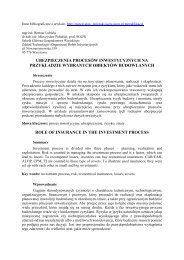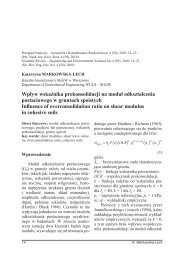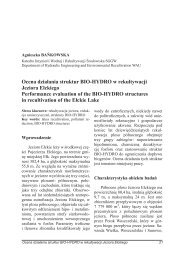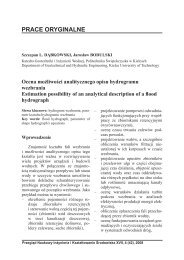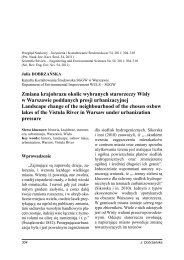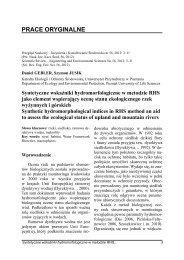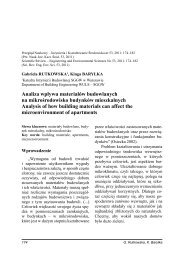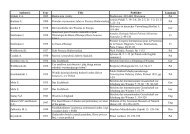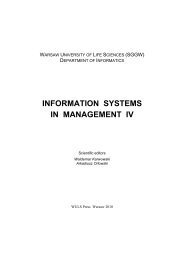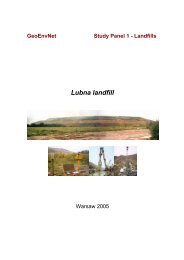ACTA SCIENTIARUM POLONORUM - SGGW
ACTA SCIENTIARUM POLONORUM - SGGW
ACTA SCIENTIARUM POLONORUM - SGGW
Create successful ePaper yourself
Turn your PDF publications into a flip-book with our unique Google optimized e-Paper software.
Economic sustainability of agriculture – conceptions and indicators 133for agricultural products, the prolonged period of return on investment in agriculturalproduction or natural conditions of agricultural production, connected with the groundfactor. The differentiation of the notions of exogenous and endogenous disparity canbe introduced on the basis of the differences between the phenomena in the nationaleconomy and in agriculture. Exogenous disparities will describe the relations betweenagriculture and the national economy while endogenous disparities will describe the differenceswithin the agricultural sector, defined as differentiation or stratification of farmsas regards the levels of incomes or other analysed categories, e.g. households’ expenses.Exogenous and endogenous phenomena constitute certain implications for agriculture,the national economy and the society.Gross national income is the basic indicator of the economic and social efficiency ofan economy. The issues of national income are constantly studied in scientific research onthe factors of economic growth and the social and economic development. They are alsothe subject of interests of political groups and parties concerned about the participationof state in the division of national income and willing to optimise the role of state in thisarea. The sociological dimension of the income issues is present in the research on thebasic differences and similarities between different social systems and in research on thefeatures of various areas with dominating conditions of a wider social system. Incomecategories are for example used in the comparative analysis of the living standard, thesocial and professional stratification, professional and educational activity, migration andemigration. They also appear in different theories, e.g. in the theories of needs, equal opportunities,social justice and others.Income issues in agriculture are the subject of economic discussions mainly becauseof their continual declining tendency in the absolute dimension and in the relative one.Such matters as location, economic potential or the type of production of a farm exert,no doubt, an influence on income discrepancies in agriculture. A reduction in incomesfrom agriculture is also connected with different patterns of participating in changingeconomic market mechanisms and in the agricultural policy, both of them being subjectsto globalisation. The future of traditional farming is often the topic of discussions. Otherfrequently appearing topics include: the variety of jobs done in agricultural families andissuing social benefits on behalf of the so-called social farms. Other aspects such as thenational economy, the economic infrastructure or alternative sources of income also considerablyinfluence on incomes from farming (Figure 2).Theoretical analysis of the profitability phenomenon in agriculture is helpful in definingunified rules which are inevitable to formulate the postulates of income policy inorder to address its activities to a strictly defined professional-and-social group. Theseneeds are met by a multilayer statistical analysis which uses summary indices describingcomplex social and economic phenomena influencing the profitability of agriculture.One of the issues discussed in scientific papers is the problem of dynamics and incomefluctuations in time. Such issues as the pace of changes, the range of increase or decreasein incomes, the time range or the spatial range of a given income situation, includingpoverty areas, have a basic meaning in evaluating the economic situation of an economicsector and the economy as a whole.As the income from farming and its accumulation are the conditions of investmentsand determine the development of a farm, low incomes result in an impairment of in-Oeconomia 10 (1) 2011




